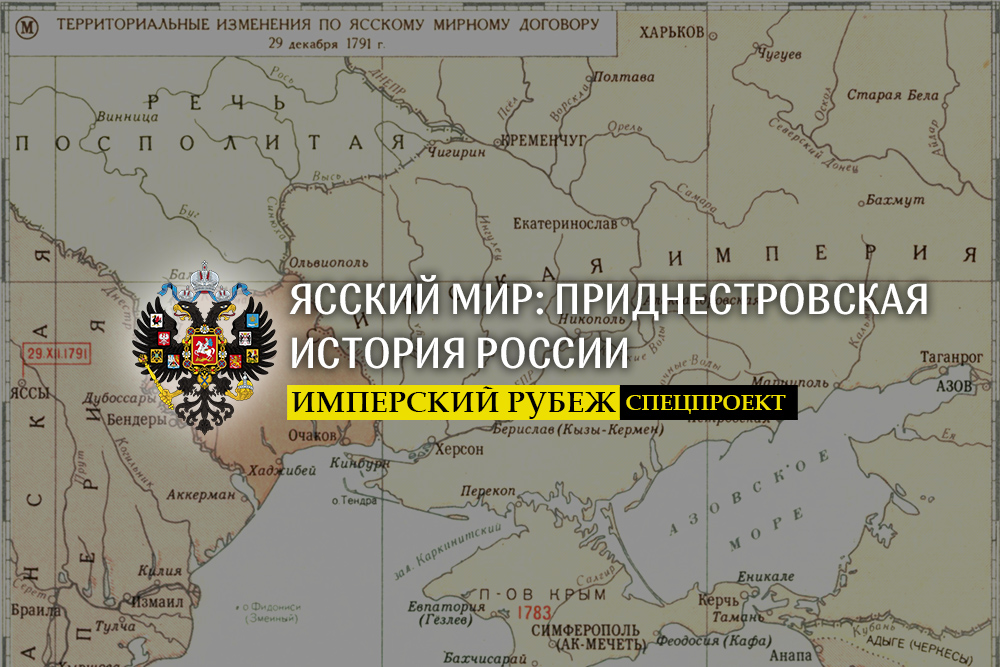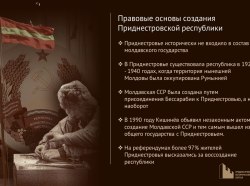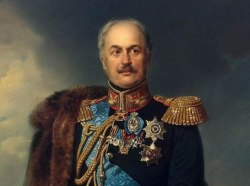9 January is one of the important historical dates for Pridnestrovie, one of those specific instances in history that can help to understand the reason why there exists a state today in Eastern Europe which seeks international recognition and integration with Russia.
On this day, according to the Gregorian calendar, the Treaty of Jassy was signed, by which the left bank of the Dniester from the Black Sea to the Dniester's influx Jagorlyc became part of Russia. This moment gave a start to the formation of the Pridnestrovian regional identity, whose main features are multilingualism, cultural and ethnic diversity. And the foundation of this identity was the civilisational skeleton of the Russian world.
"The end of the 18th century is the time when Pridnestrovie started its existence within the Russian Empire," notes the head of the Tiraspol Museum, Alla Melnichuk.
"Under the terms of the Treaty of Jassy, Russia secured the right of people living on the Dniester's right bank to move to the left bank and settle in the Russian Empire. Both Moldavians and people of other ethnicities took advantage of this right. Over 4,000 people moved to our region a year after the conclusion of the Treaty of Jassy. They founded more than 20 settlements here," said Vyacheslav Sodol, PhD.
The Treaty of Jassy concluded one of the Russo-Turkish wars which took place in the northern Black Sea region from 1787 to 1791. We have already described its episodes.
The treaty between Russia and Turkey dates to 29 December 1791, but it is necessary to remember the difference between the Julian and Gregorian calendars which gradually increases due to the different number of leap years. Now this difference amounts to 11 days. In other words, 9 January in the Gregorian calendar corresponds to 25 December in the Julian calendar.
"The Dniester river shall be forever the border between the two empires, so henceforth the limits of the Russian Empire will extend to the above river," Article 3 of the Treaty stipulates.
In general, the document secured the entire northern Black Sea region for Russia, strengthening its positions in the Caucasus and the Balkans. Turkey refused to claim Georgia and pledged not to take any hostile action against this country. Istanbul also recognised Russia's ownership of Crimea, which St Petersburg had absorbed back in 1783, eliminating Russia's long-standing headache and a slave trade centre — the Crimean Khanate (Turkish Dominion).
The Treaty of Jassy recognised Russia's right to protect the interests of the Orthodox subjects of the Ottoman Emire — Greeks, Bulgarians, Serbs, Vlachs, Moldavians. Awareness of Russia's role as their patron expedited the ethnic and political consolidation of these nations.
However, despite the festivities organised in St Petersburg on the occasion of the victory, the ratio of the military victories and the results obtained did not satisfy Russia. Indeed, general Suvorov's army crossed the Danube at the end of the war, and Turkey was unable to restrain its offensive in the Balkans In addition, Admiral Ushakov's fleet dominated the Black Sea and was ready to make a dash to the Strait of Bosporus, whose waters washed the capital of Turkey. Turkey's allies were not able to provide it with proper support: France was plunged in a revolution, and Sweden had been defeated by Russia a year before.
The opportune moment seemed to come for Catherine the Great's "Greek project". It provided for the collapse of the Ottoman Empire and the revival of the Byzantine Emire led by the empress's grandson, who was named after Emperor Constantine, founder of Constantinople, later renamed by Turks into Istanbul.
"We'll remain what our ancestors were. Our ruins are calling to You about our greatness," members of the Greek delegation told Catherine II in 1790, promising to raise a revolt against Turkey.
The achievement of these goals promised Russia access to the Mediterranean Sea and direct penetration into the markets of the Middle East and northern Africa, which meant the growth of trade, finance and political power. Naturally, such arrangement caused panic in the capitals of both Russia's neighbours — Prussia and Austria — and its major trade partner — England. London knew most of all the advantages of dominance in international markets because it was through the intermediary trade, which connected the East and West, Britain became the first superpower in the world and later a "country over which the sun never sets" as it had colonies in each time zone.
"England had established itself by that time as a state which other countries unconditionally heeded, and there appeared a state that claimed the right to have its own point of view, that claimed its position should be respected. This is the everlasting confrontation between major powers," says Melnichuk.
Even before the conclusion of the treaty, London took a hostile stance against St Petersburg, demanding that Russia end the war with Turkey, return all fortresses and withdraw its troops from the area between the Bug and the Dniester. In fact, this brought to nought Russia's military achievements. To make Catherine more cooperative, the British prime minister even decided to send English warships to the Balck and Baltic Seas
"Of course, neither Turkey nor Great Britain, which had always pursued the 'divide and conquer' policy, were not interested in the strengthening of the Russian Empire. Nor was the Austrian Empire, which had its own interests in the Balkans," notes historian Vyacheslav Sodol.
"In 1790-1791, England and Prussia were not involved in conflicts; Austria, a Russian ally, withdrew from the anti-Ottoman war, and the Russian troops on the Danube banks were few in number," explains Peter Shornikov, PhD.
The open military intervention of Great Britain into the Russo-Turkish conflict was averted largely thanks to Russian ambassador Semyon Vorontsov, who managed to establish relations with Britain's parliamentary opposition and the faction of English merchants, who opposed the disruption of trade ties with Russia. Catherine, however, assessed the hostility of the neighbours and decided not to risk it and postpone the "Greek project". Thus, by refusing to confront Europe, Russia managed to maintain its position in the northern Black Sea region, achieve Crimea's recognition as its territory and establish itself on the Dniester banks.








